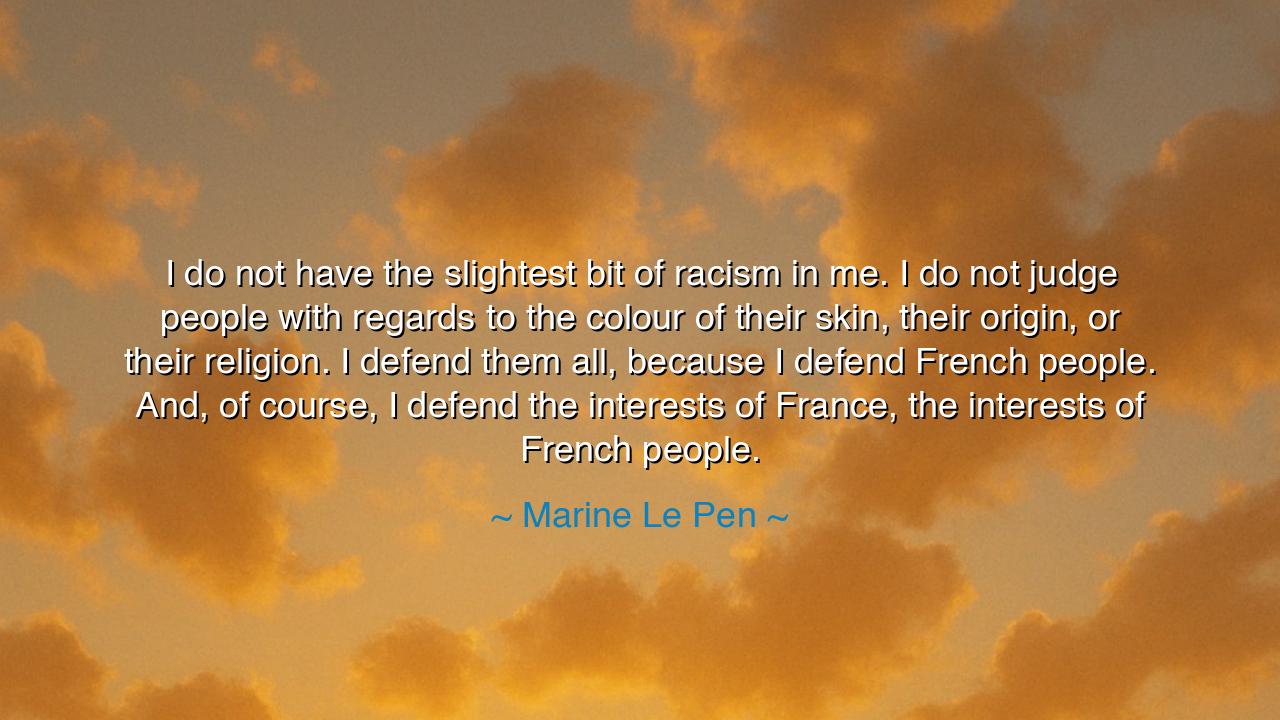
I do not have the slightest bit of racism in me. I do not judge
I do not have the slightest bit of racism in me. I do not judge people with regards to the colour of their skin, their origin, or their religion. I defend them all, because I defend French people. And, of course, I defend the interests of France, the interests of French people.






Hear now the voice of Marine Le Pen, who declared: “I do not have the slightest bit of racism in me. I do not judge people with regards to the colour of their skin, their origin, or their religion. I defend them all, because I defend French people. And, of course, I defend the interests of France, the interests of French people.” These words are fierce with patriotism, wrapped in the language of equality, and born from the turbulent debates of modern nations. For in them we hear not only a defense of self against accusation, but a proclamation of loyalty: that one’s truest duty is to the people of one’s homeland, beyond divisions of race or creed.
The origin of such a statement lies in the storm of political struggle, where leaders are often judged by how they speak of unity and difference. France, with its long history of revolutions, empires, and migrations, has always wrestled with the meaning of nationhood. To some, defending the people of France meant defending a particular heritage, a particular tradition. To others, it meant embracing all who called themselves French, regardless of their color or faith. Le Pen’s words belong to this eternal conversation: who are “the people,” and what does it mean to defend them?
History provides parallels. In ancient Rome, when the empire stretched from Britannia to Africa, from Gaul to Syria, many asked: what does it mean to be Roman? Was Rome a city of Italians alone, or of all who pledged loyalty to its laws? Over time, emperors such as Caracalla extended citizenship widely, declaring that all free men within the empire could be called Roman. This, too, was a way of saying: I defend them all, because I defend Roman people. The struggle to define the boundaries of belonging is as old as civilization itself.
Yet these words also carry warning. For throughout history, leaders have claimed to speak for the people while excluding some from that definition. In the French Revolution, the cry of liberty, equality, fraternity was noble, yet suspicion and division led to the guillotine for many. In America, the words “all men are created equal” were proclaimed, yet slavery endured for generations. Thus, when a leader declares that they defend “all people,” the world listens carefully, testing whether the defense is truly universal, or only for those deemed worthy.
And yet, let us hear the strength in the saying as well. To proclaim the rejection of racism is to align oneself with a truth as ancient as the prophets, who declared that all nations are alike in the eyes of the Creator. To claim that one does not judge by color, origin, or religion is to echo the wisdom that humanity is bound together by deeper ties than skin or custom—the ties of shared destiny and shared home. In this sense, the words remind us that patriotism and equality need not be enemies, but may walk together.
The lesson, O child of tomorrow, is this: love of country must never descend into hatred of others, nor must equality erase loyalty to one’s homeland. It is possible to serve a people without scorning the stranger, to defend a nation without despising the world. The danger is always balance—too much emphasis on separation breeds division, too much emphasis on universality dissolves identity. True wisdom lies in holding both: a deep defense of one’s people, and a refusal to diminish others in the process.
Therefore, take action. In your own heart, root out the seeds of prejudice, for they are poison. Judge no man by skin or faith, but by the content of his spirit and the measure of his deeds. At the same time, do not be ashamed to love your homeland and to seek its flourishing, for loyalty to one’s people is a noble thing when it is guided by justice. Defend your community, but never at the cost of your humanity. In this balance lies the path to greatness: to stand firm in patriotism, but also in compassion, knowing that in defending your people rightly, you defend the dignity of all.






AAdministratorAdministrator
Welcome, honored guests. Please leave a comment, we will respond soon